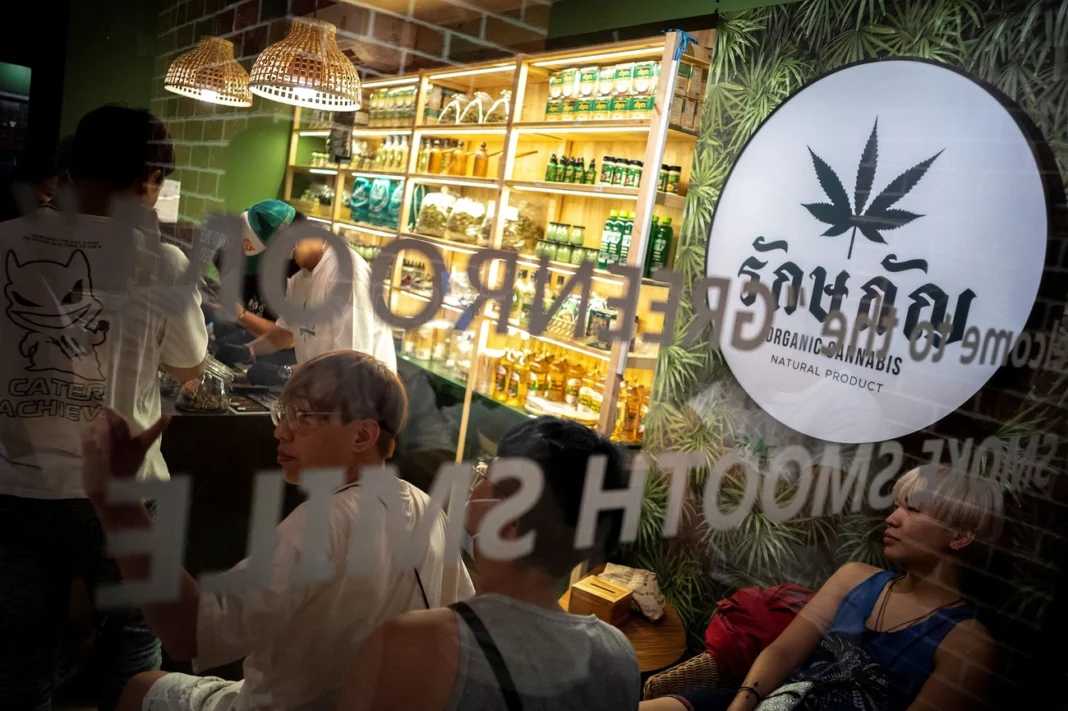Thailand made history as Asia’s first country to legalize marijuana. The government’s sudden reversal created chaos in the emerging cannabis market. The 2022 legalization seemed like a forward-thinking decision that would attract tourists and create new business opportunities. However, recreational use and public health soon became serious concerns.
Thousands of cannabis businesses sprouted across the country with great optimism. The Thai government then shocked everyone by announcing plans to label cannabis as a narcotic again. This dramatic change left business owners, investors, and supporters in disbelief. The sudden policy reversal shows how difficult it is for countries to reform cannabis laws without proper regulations. Thai stakeholders now face uncertainty about their future as they try to understand what went wrong.
Thailand Legalizes Cannabis, Then Reverses Course
Image Source: CNN
Thailand made a groundbreaking move by legalizing medical cannabis in 2018, becoming Asia’s first nation to welcome cannabis for health purposes. The country’s Narcotic Act had classified cannabis as a class-5 narcotic since 1979, which banned all possession, sale, and use.
A bolder step came in June 2022 when Thailand’s Food and Drug Administration removed all cannabis plant parts from the controlled substances list. This move made Thailand Asia’s first country to allow sales, growing, and possession without legal penalties.
The cannabis industry grew faster after decriminalization. Licensed stores numbering between 10,000 and 18,000 opened nationwide, creating a billion-dollar market. Thailand’s Chamber of Commerce expected the industry to reach $1.8 billion by 2025. The policy change also led to 4,200 prisoners getting their freedom.
The government planned to give away one million cannabis plants to households to boost home growing. This quick expansion happened without detailed regulations. The minimum buying age was set at 20 years, but sales practices and product quality had little oversight.
Problems with uncontrolled access became evident by 2024. Research showed cannabis addiction rates jumped after decriminalization. Government spokesman Jirayu Houngsub stated that “unregulated access to cannabis has created serious social problems, especially when you have children and young people”.
Thailand’s government took strong action to address these issues. Public Health Minister Somsak Thepsutin signed an order on June 23, 2025, banning cannabis sales without medical prescriptions. The ban started on June 26, and Thepsutin declared that “cannabis will be classified as a narcotic in the future”.
This sudden policy change shocked Thailand’s cannabis industry. Bangkok’s Green House Thailand dispensary worker Punnathat Phutthisawong described the industry as “stunned”. Cannabis activist Chokwan Kitty Chopaka said that “the cannabis industry has become a hostage to politics”.
Cannabis Industry Faces Regulatory Whiplash
Image Source: KARK
Thailand’s billion-dollar cannabis market stands at a crossroads. New regulations could destroy an industry that supports over 18,000 licensed shops.
“Owners are freaking out, a lot of them are scared,” says Chokwan “Kitty” Chopaka, a cannabis supporter who once owned a dispensary in Bangkok. The latest rules require shops to sell cannabis only to customers with medical prescriptions. Any seller who breaks this rule could face a year in jail and pay a 20,000-baht ($614) fine.
The rules have become even stricter. Shops must now buy products only from pharmaceutical-grade farms with certification from the Department of Thai Traditional and Alternative Medicine. They need to report their product sources to authorities each month and can sell only enough for 30 days of personal use.
Small producers worry about their survival. “Most permits are going to big players, while small farmers like me are left waiting or falling victim to scams,” says cannabis grower Somkiat Nitiketkosol. The tighter restrictions might force many small farms to shut down.
The changes have shocked industry workers like 25-year-old Punnathat Phutthisawong from Green House Thailand dispensary. “This is my main source of income. Many shops are probably just as shocked because a lot of them invested heavily,” he says.
The Thai Chamber of Commerce expected the cannabis trade to reach $1.2 billion by 2025. These predictions seem unrealistic now. Critics say the new rules will drive sales underground rather than stop them completely.
“The cannabis industry has become a hostage to politics,” says Chopaka. Her words echo the frustration felt across the industry. Groups like Writing Thailand’s Cannabis Future Network plan to protest the government’s decision.
Officials Justify Ban Amid Rising Social Concerns
Image Source: Nation Thailand
Thai government officials cite major social problems to justify their reversal of cannabis policies. Their spokesperson Jirayu Houngsub stressed that easy access has created problems “particularly for children and young people.” The situation now requires a return to “controlling cannabis for medical use only”.
Health Minister Somsak Thepsutin stands firm on this issue due to health and addiction concerns. He states that recreational cannabis “has been found to damage brain development and lead to depression and suicide”. The minister also claimed that “about 40% of young Thais with heroin addictions originally started with cannabis”.
A study by the Office of the Narcotics Control Board showed that “the number of people addicted to cannabis had spiked significantly after it was decriminalized”. This information strengthened the officials’ case that they needed to step in.
The government’s stance matches public opinion. Thai authorities conducted a survey that revealed “at least 80% of the 111,201 respondents supported a draft plan to once again label marijuana as a ‘category five’ from next year”. This strong majority has made officials confident about reversing their policy.
The sudden change happened right after the Bhumjaithai Party, which strongly supported cannabis legalization, left the ruling coalition. Critics now question why the policy changed so quickly.
Those who support cannabis have called these new rules “politically motivated”. Chokwan Chopaka believes the current rules work well but need better enforcement. She stated “We know we need regulation. We need control. The existing rule that is in the announcement previously needs to be enforced”. She suggests they don’t need such strict changes.
A Policy Experiment Cut Short
Thailand’s cannabis experiment, once praised as a progressive milestone in Asia, now faces a crucial turning point. The country’s trip from strict prohibition to decriminalization and back to restriction shows how governments struggle with dramatic policy changes that lack a complete regulatory framework.
The cannabis industry showed great promise at first, but grew too fast without proper safeguards. What started as a $1 billion chance with thousands of dispensaries across the country now faces an uncertain future. Small-scale farmers and shop owners feel exposed, especially when you have the changing rules under their feet.
Officials point to real public health concerns. They cite higher addiction rates and easy access by youth as the main reasons to reverse the policy. In spite of that, the timing of this change – right after pro-cannabis politicians left the ruling coalition – makes people ask questions about political motives.
Other nations can learn valuable lessons from Thailand’s cannabis story. The most important takeaway shows why strong regulations need to be in place before legalization, not after. On top of that, it shows how political changes can alter business landscapes whatever the economic benefits might be.
Thailand’s cannabis sector now waits to learn its fate as the government moves to label cannabis as a narcotic again. Thousands of business owners and their workers must make tough choices about their future. The industry might adapt to medical-only rules or disappear into history. One thing is clear – Thailand’s bold experiment with recreational cannabis ended almost as fast as it started.






